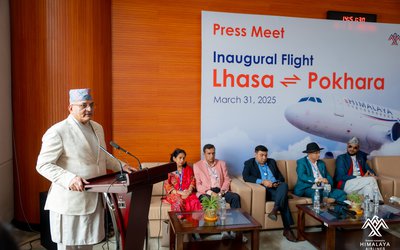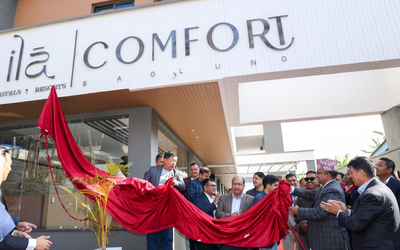
Although her daughter Sangita Shrestha and grand-son Vijaya have already joined to operate business of Dwarika's Hotel, 87-year old Ambica Shrestha continues to engage in all activities.
At a time when many Nepalese youngsters are deserting Nepal, Ambica Shrestha is among a few fortunate persons to have three generations working with her in the business. Completing his graduation from Germany, Shrestha's grandson chose the path taken by his grandfather, grandmother and mother to carry on the mantle of business.
"Following the completion of graduation from Germany, he received a number of offers, of high paying jobs. He has decided to come to Nepal and work in his family business," said Shrestha, with pride and satisfaction. "Vijaya has been taking hotel's marketing, sales and business promotion jobs."
Ambica Shrestha has seen all the ups and downs of social and economic transformation of Nepal as a close eye-witness, from being a woman of a closed society, with women concentrating on household chores, to present working, empowered and globally recognized Nepali woman.
She was among the few women with higher qualification and fluent English in a Kathmandu valley of 1950s that was a different world than it is today. Isolated and unknown for the globe, Nepal had started its journey to transformation with women like Ambica Shrestha, who giving due time to family and family affairs, also started jobs to show other women that she was capable to manage both.
Although he died five years ago, former Attorney General and eminent constitutional lawyer late Moti Kazi Sthapit used to mention Shrestha's role as a source to bring change in traditional society.
Staphit was not alone, everyone admired her dedication and skills in Kathmandu of 1960s where rarely any woman had fluency in English. "I have always maintained balance with family and my work. I don't have any complaints against our values and culture. I am so proud of it as it teaches us respect to old and genius," said Shrestha.
With the literacy of women standing at two percent, with few working women, Shrestha, who has been honorary consul for Spain, was among a very few women in Kathmandu in 1960s to work in foreign missions and teach foreign language.

Her husband, late Dwarika Das Shrestha, badahakim of Biratnagar, whose stand forced the then government of India to change the location of Kosi Barrage in Nepal's side, was also a liberal minded person.
“I was honored by being appointed a public affairs officer and the prime minister was B.P. Koirala. K.P. Bhattarai and then chief justice used to attend. We used to organize various programs during 1960s. I was the first to start display at the window at New Road. I started film show and lectures in USIS.”
Although Shrestha was married to an elegant Newar family of Kathmandu with higher connections, she always preferred to talk with commoners and she promoted women from middle class family to start work.
"Whatever the position I held, I always see education and economic empowerment as a key to bring the change in the status of women," said Shrestha. "I always inspired women to be nurses, doctors, engineers and entrepreneurs."
An English teacher at Kanti Ishwori School in 1957 and 1958, a girl’s school, Shrestha also ran English language class and training at British council. With her own capacity, Shrestha also organized various programs in American Library in 1960s. "Do you know how much I was paid, my salary was Rs.80.00 per month. I was the first public affairs officer of the United States Information Service.”
Shrestha believes that education is the key to success in life, and teachers make a lasting impact in the lives of their students. "During my early career, this was what made my best efforts," said Shrestha.
As almost six decades have passed, many of her students, who are now themselves in mid seventies and eighties, remembered her role and inspiration as a teacher.

In a closed society, it was not easy for women to take such an active role. During that period, overwhelming number of Nepalese women spent their time in household chores and giving birth to children.
"I have found it very different. When we started to work, it was difficult for daughter-in-laws to go out and work. Daughter-in-laws were not allowed to work outside family. The opening of women is gradual and slow. Women have very limited choices, either teachers, nurses, doctors or government employees. Now women are pilot, soldier and entrepreneurs and engineers. Mostly women were nurses and teachers. Women started working. Even after marriage, they started to put conditions. My late husband promoted heritage since 1960.”
After getting married to Dwarika Shrestha, Ambica Shrestha had limitations and social pressure as well. However, she took all her families in confidence and continued her work for the betterment of society.
As it is said by Maya Angelou, a prominent woman activist and entrepreneur, "I've learned that people will forget what you said, people will forget what you did, but people you never forget, how you made them feel."
In the last seven decades of Nepal’s social transformation, entrepreneurship development, heritage preservation and empowerment and equality, Shrestha has been a close witness of change. She said one needs to change the society and order, nobody will come to show you. "I can show you the way to be successful but I cannot push you to be successful," said Shrestha.

President of Hotel Dwarika's, a renowned hotel known as a living museum of Nepal's heritage and artifacts, Shrestha has been actively taking part in social activities even today without looking for any personal benefit.
"I feel fortunate if I can motivate 10 women and persuade them to start entrepreneurship. Nepalese are very talented and hard working. However, they have to learn that they need to start from small to become big and tall," said Shrestha.
Attending different works, spending a few hours at her hotel, Shrestha 's daily chores begin from early in the morning. "I regularly wake up early in the morning and sleep at 12. From taking part in social programs, diplomatic engagements, professional work and business, Shrestha's day is made up of a list, just too long. After her knee surgery a few months back, Shrestha has to go for therapy.
As a voracious reader, Shrestha buys the latest books. She used to visit Mandala Books. After her knee surgery, she has stopped to visit the book stall but still buys the books.
Started by husband late Dwarika Das Shrestha with initially five rooms, Hotel Dwarika's has over 800 rooms now. Even at the time of emergence of globally branded hotels, Dwarika’s maintains its distinct identity.
"At the end of the day, you are solely responsible for your success and your failure. And the sooner you realize that, you accept that, and integrate that into your work ethic, you will start being successful. You cannot blame others for the reason you aren't where you want to be," said Shrestha.
Simple and humble, Shrestha always looks on new generations of young Nepali women to be part of the social transformation. Growing up in a close society of Kathmandu, Shrestha knows the difficulties of women.
Character cannot be developed in ease and quiet. Only through experience of trial and suffering can the soul be strengthened, ambition inspired, and success achieved.
FBPWN In Nepal
For the young Nepalese women entrepreneurs, renowned tourism entrepreneur, heritage lover and social worker Shrestha is a source of inspiration. Shrestha always backs young women entrepreneurs to make a difference in society, branding Nepalese products globally.
Whether through her tourism enterprise, small handicraft or through social work, heritage conservation, Shrestha has never spared time not to encourage youth to champion Nepali goods and products.
Established in 1971 long before the establishment of Social Welfare Council, Cairo based Federation of Business Professional Women - Nepal (FBPWN) has been supporting to promote women business professional. Opened in 1971, FBPWN was officially registered in 1975 in Nepal.
"After the establishment of the organization, we had brought women from far away Jumla and Kalikot along with their handicraft and weaving tools to display at Hotel Dwarika's floor in 1973," said Shrestha. At that time Sir Edmond Hillary visited the exhibition and we gifted him a handmade Dhaka shawl, which he wore during the dinner with King Birendra, who reportedly asked Hillary about the Dhaka Shawl.
Chairperson of FBPWN, Shrestha has been encouraging youngsters to organize various programs aiming to promote Nepali indigenous industries and products in the global market. The organization has been bee organizing various programs to promote Nepal made products to the national and international markets.
"Our Hotel, Dwarika's Hotel, has been using Nepali dress as official dress for a long time. I request all to promote Nepalese dress in respective organizations," said Shrestha.
Under the leadership of Shrestha, FBPW has been organizing various programs in Nepal targeting the women as per the mission of BPW. The International Federation of Business and Professional Women (BPW International) was founded by Dr. Lena Madesin Phillips in 1930.
FBPW – Nepal, with its Sustainable Development Goals has been organizing various programs to empower Nepalese women and promote Nepalese products.
BPW International is one of the most influential international networks of business and professional women with affiliates in over 100 countries in five continents. Its members include influential women leaders, entrepreneurs, business owners, executives, professionals and young business and professional women.
BPW develops the professional, business and leadership potential of women through skill building, networking, advocacy, and mentoring around the world.
BPW International aims to unite business and professional women in all parts of the world to work for women's economic independence, equal opportunity and representation in economic, civil and political life.
It also encourages and supports women and girls to develop their professional and leadership potential, undertake lifelong education and training and use their abilities for the benefit of others, locally, nationally and internationally.
Completing her secondary education in St. Joseph from Darjeeling, she settled in Nepal after marrying Dwarika Dash Shrestha, an artist and administrator. With the help of Ambica, Shrestha founded a high-end heritage hotel with a collection of antique art.
Shrestha managed the hotel she had established with her husband after his death in 1991. Ambica is working as honorary consulate General of Spain for Nepal. She also serves as the head of Nepalese Heritage Society and Business and Professional Women Nepal and works to preserve the cultural heritage of Nepal and improve the lot of underprivileged women.
Strong and determined, Shrestha took command of the growing business in that time when her husband passed away in 1991 and raised her small hotel into one of the most reputed, high end hotels of Nepal.
The Dwarika’s Hotel not only is famous in Nepal but also overseas for its majestic architecture, use of traditional artifacts, artistic indoors and brilliant woodcarvings that reflects the Nepalese identity that allows the guests and visitors to have more knowledge about Nepalese art and tradition.
Apart form owning the Dwarika’s Hotel, she is also the head of Nepalese Heritage Society and Business and Professional Women Nepal, which works in field of preserving the cultural heritage of Nepal and for the uplifting underprivileged women. She has contributed a lot in the field for uplifting the standard of Nepali women.
In her office, she had kept the desk which her husband had designed. The paintings on the wall, the small idols of Lord Ganesh, the series of encyclopedias, etc. adorn her office room.
She believes that Lord Ganesh in her office gives soothing calmness to her and was with her in every step of her life during the sorrow and happiness. The office is arranged by herself and her daughter where she carries out different meetings, talks and decisions. Besides this, the office leads to the beautiful views through the window where she constantly watches out during the leisure time.
Shrestha is a great supporter of women and believes that if women are given opportunity, they can prove what they can do. So, the one thing that we can learn from her life is to never give up, no matter how difficult the path is.
Until its closure in 2000, the British Council libraries served as important social meeting and cultural convening spaces. Ambica Shrestha partnered with the British Council to train young women as secretaries in Nepal which led to the start of an industry that did not exist before.
British Council supported Ambica and others to establish the Britain Nepal Society. She went on later to become the owner of heritage hotel Dwarika's and led light of heritage conservation in Nepal.
In Search For Root

Chairperson of Nepal Heritage Society, Ambica Shrestha has also been actively taking part in heritage conservation and protection of heritage. "Protection of heritage site is my passion and I have also commitment on it," said Shrestha who hosted many well known figures from the around the world. "Culture and heritage can show your roots. One needs to know where is his or her root and identity."
When people are getting older, they start to think about their roots. Heritages are not only what we can see in Kathmandu. We have our own heritage in villages of Rai, Brahmin, Chhetri , Gurung and Magar. All have their own heritages and culture and we need to maintain them. There is modernization but we need to keep our root. In the name of global culture, we cannot discard our culture and heritage.
"Our culture teaches us to respect all our seniors and elders and follow the discipline. We need to keep our values and culture to respect people and to be disciplined," said Shrestha.

Keshab Poudel
Poudel is the editor of New Spotlight Magazine.
- ERC Nepal Is Focused On Expanding Distribution And Transmission To The Private Sector: ERC Chair Dr. Dhital
- Jul 06, 2025
- FOURTH PROFESSOR Y.N. KHANAL LECTURE: Nepal-China Relations
- Jun 23, 2025
- Colonel JP CROSS: Centenary Birthday
- Jun 23, 2025
- BEEN: Retrofitted For Green
- May 28, 2025
- GGGI has been promoting green growth in Nepal for a decade: Dr. Malle Fofana
- May 21, 2025















